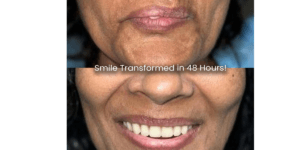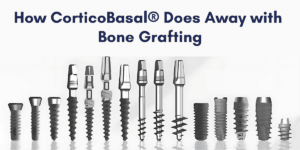Dental implants offer a reliable way to restore oral health, but sometimes traditional implants are not suitable. Recognizing when Corticobasal® implants – an advanced implant solution – may be a better fit can save time, discomfort, and long-term complications. Let’s have a look at the top 5 warning signs that indicate you need these immediate-loading implants and why you must completely avoid conventional implanting methods.
5 Warning Signs You Need CorticoBasal® Implant
1.Fully Compromised Dental Condition
If your mouth presents a chaotic mix of failing teeth, severe gum issues, or chronic infections, simple repairs often fall short. Corticobasal® implants excel in full-arch rehabilitation as they anchor in the cortical bone. It provides a stable and durable foundation for major dental reconstructions.
Please contact us @ +91 9289678861 for more info
2.Severe Bone Loss
Loss of jawbone often disqualifies patients from traditional implants unless they undergo bone grafting. Corticobasal® implants bypass this barrier, securing themselves in the dense basal bone – making them a practical solution for those with significant bone deterioration.
3.High-Risk Diabetes with No Remaining Teeth
Patients managing conditions like type 2 diabetes often struggle with traditional implants because of compromised bone healing. However, studies show that Corticobasal® implants deliver similar success and satisfaction for diabetic patients as well as those without systemic diseases.
4.Complex Medical History
Individuals undergoing chemotherapy, radiation, or long-term medications frequently qualify out of conventional implant candidacy. Corticobasal® systems require no bone grafts, employ fewer surgical steps, and function under local anesthesia – minimizing risk for medically fragile patients.
5.Existing Periodontitis or Smokers
Periodontal disease dramatically undermines jawbone integrity. Traditional implants in such contexts face high failure rates. According to studies published on major research portals, Corticobasal® dental implants have proven to sustain robustness and quality-of-life improvements, even in case of patients who smoke regularly and/or are suffering from periodontal disease.
Why Do These Signs Matter?
| Warning Sign | Why It Points to Corticobasal® Implants |
| Bone loss & periodontal disease | Anchored in cortical bone, better suited for compromised oral structures |
| Diabetes & complex medical issues | Immediate loading, fewer surgeries, less healing required |
| Smoke & gum disease | Polished implant design resists infection and peri-implantitis |
Understanding the Advantage
Corticobasal® implants leverage orthopedic principles – meaning they are splinted and provide support immediately, without relying on bone grafting or osseointegration processes. This allows patients to gain functional, permanent teeth within 48 hours.
When To Consult a Dental Implant Expert?
If you encounter these warning signs – persistent tooth infections, loose restorations, sunken jaw, brittle bone under X-ray – it’s time to explore Corticobasal® solutions. A dental implant specialist can assess cortical bone availability, systemic health concerns, and your long-term oral needs.
Final Words
This advanced implant approach isn’t merely for severe cases – it optimizes outcomes for nearly any patient facing compromised oral conditions. If your dental history aligns with these warning signs, Corticobasal® implants present a safe, efficient, and lasting alternative to conventional implant methods.
Expert Care by Dr. Vivek Gaur
Under the care of Dr. Vivek Gaur, patients receive expert guidance in Corticobasal® implantology. His expertise ensures customized treatment tailored to systemic health and long-term success.
Keep yourself updated by following our Social Page for the latest news and information.






